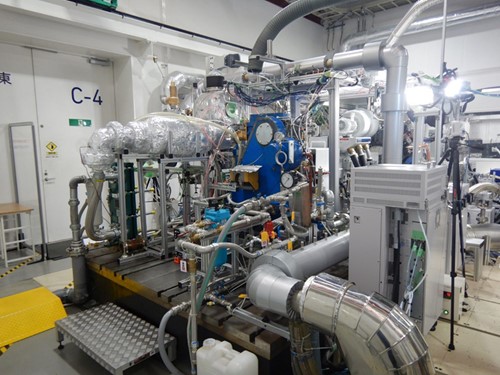News
MHIET, AIST conduct combustion test for H2 engine

The Mitsubishi Heavy Industries Group has been working on the development of various products that will have zero CO2 emissions. Mitsubishi Heavy Industries Engine & Turbocharger, Ltd., a part of the group, is strengthening its efforts to develop a hydrogen engine based on their existing diesel and gas engines. MHIET has conducted a combustion test of a hydrogen engine in a joint research project with Japan’s National Institute of Advanced Industrial Science and Technology.
A modified single cylinder gas engine (bore 170mm x stroke 220mm) based on MHIET’s 4-stroke reciprocating gas engine "GSR series" offered in 6 to 16 cylinders was installed at the AIST Fukushima Renewable Energy Institute (Koriyama, Fukushima Prefecture).The test was carried out to identify the conditions to achieve stable combustion of 100% hydrogen without emitting CO2.
MHIET and AIST began the joint research on combustion of hydrogen on an engine in fiscal 2019. MHIET and MHI Research and Innovation Center designed and built the hydrogen engine using the knowledge of hydrogen combustion technology, industrial-use diesel engines and natural gas engines, studied the conditions for optimum combustion, and analyzed the test data. AIST constructed and operated the hydrogen supply equipment and the test bench and acquired data utilizing its experience in developing combustion technology for high-power, high thermal efficiency, and low NOx (nitrogen oxide) hydrogen engines for large scale power generation.
Hydrogen has a wide flammability range and a high combustion wave propagation velocity, making the engine prone to abnormal combustion such as backfire and knocking. The test used MHIET’s existing lean-burn gas GSR series engine with additional modifications in fuel supply method, ignition method, timing of intake air valve closing, and excess air ratio etc. for optimum combustion to determine the conditions that ensure stable combustion with hydrogen-only firing and premixed firing. Converting the test results, the maximum output is estimated to be 340kW for 6-cylinder engine and 920kW for 16-cylinder engine. MHIET intends to accumulate more test data that will lead to the realization of multi-cylinder hydrogen engines and aims to make the engines available for the introduction of hydrogen economy in the 2030s.
Further into the future, MHIET will replace the gas engine generator set currently used with "EBLOX" in the "Triple Hybrid" self-sustaining power supply system with a hydrogen engine generator set to provide a distributed energy solution that achieves a self-sustaining power supply with no CO2 emission using solar power, batteries, hydrogen engines, and contribute to an energy-stable and carbon-free economy.

